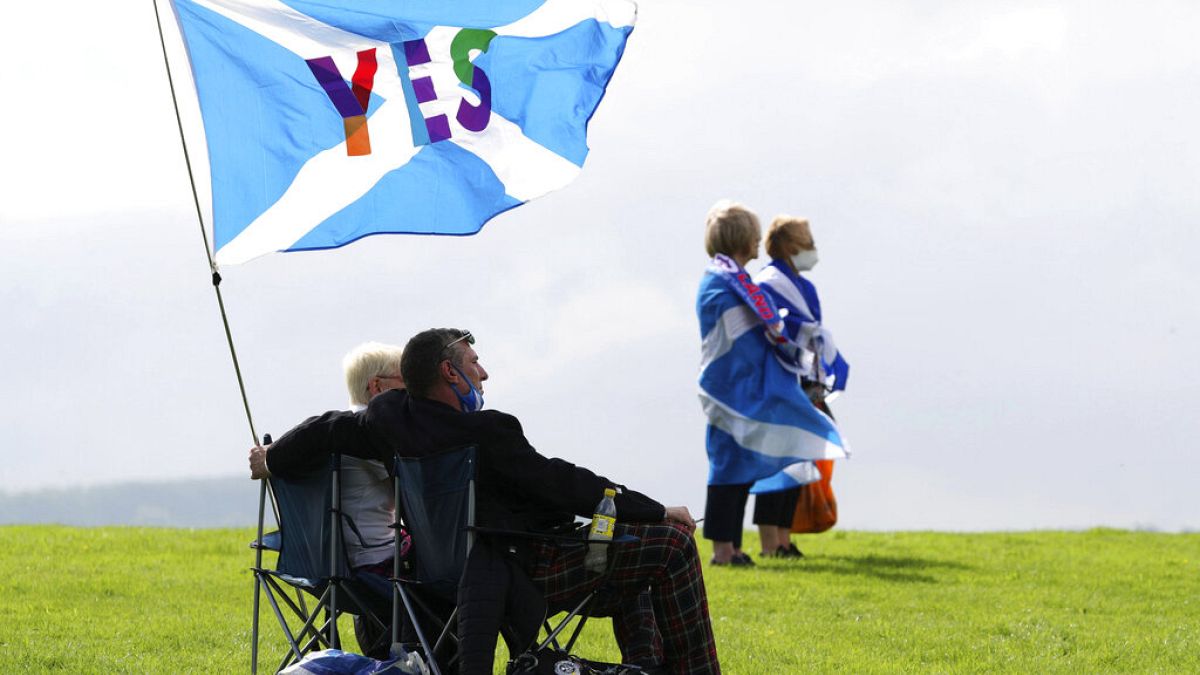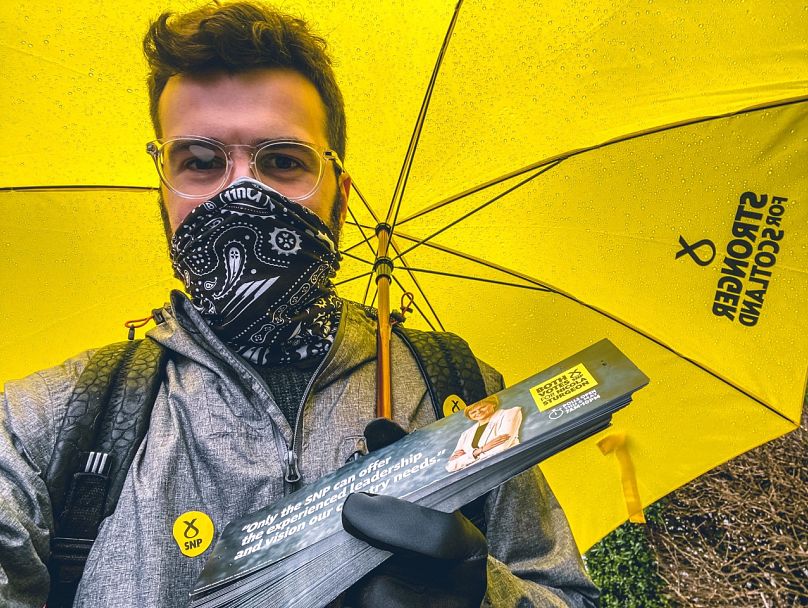Feelings of 'betrayal', Brexit, and Westminster scandals have turned these Scots away from supporting their centuries-long union with England.
Eight years ago Ruaridh Hanna was so staunchly opposed to Scottish independence that he celebrated wildly when the referendum results came in.
The 28-year-old, from Inverness, had been part of the campaign for Scotland to remain part of the United Kingdom back in 2014.
But fast forward to the present and he has come full circle.
Now a paid-up member of the Scottish National Party (SNP), Hanna represents a segment of no-to-yes voters that SNP leader Nicola Sturgeon hopes will tip the balance in any future referendum on independence.
So what made him switch?
Hanna tells Euronews that after Scots rejected independence by 55.3% to 44.7%, people were "cautiously optimistic" about London's promises of further devolution, which would have given Edinburgh more autonomy within the UK.
But, he claims, “Westminster started wheeling all that back" and that eventually "nothing happened at all”.
“I go so far as to call it a betrayal,” he said, claiming that the powers which had been transferred to Scotland were only “surface changes”.
Following the 2014 No Vote, the 2016 Scotland Act gave Edinburgh more say over its income tax, welfare, railways and oil and gas activity, with then Scottish Secretary Alistair Carmichael saying the UK had "kept its end of [the] historic bargain."
However, despite pledging "extensive new powers" for Scotland, Westminster still controls some 70% of the country's taxation and 85% of its welfare spending, according to the SNP.
‘I am a European first and foremost’
But Hanna is far from the only one.
In fact, polls show that support for independence has steadily narrowed since 2014, with many no voters or abstainers now wanting to cut their country's 314-year union with England.
Another “big wake-up call” for Scots was the UK’s 2016 referendum on whether to leave the European Union.
Unlike in England and Wales which produced strong majorities in favour of withdrawing from the bloc, 62% of Scots voted in favour of remaining.
“Scotland clearly wanted to remain in the EU but it has been dragged out against our will,” said Hanna, claiming the decision had created staffing shortages and severely damaged the Scottish economy.
The economic impact of Brexit is disputed, with others arguing that the Coronvarius pandemic and Ukraine war are also damaging the UK economy.
Apart from economics, some Scots' “European identities” had influenced their decision to switch sides.
In 2014, John Craig, 25, voted no to independence, over concerns that leaving the UK would result in Scotland dropping out of the EU.
Soon to become a student at the time, he was particularly worried about losing the opportunity to study abroad as part of the EU’s ERASMUS exchange programme.
When the UK left the bloc, which terminated the European study abroad programme, Craig was unable to go and study in the Netherlands and Germany, as he had planned.
“I changed my mind mostly because of Brexit,” he said. “From that point on, I thought to myself: 'I just don't want to do this anymore. Why am I letting all this happen in my name?'”
“If we have the opportunity to vote again I would vote for independence one hundred per cent,” he added.
Craig, now a classical musician, said he was saddened by the “loss of cultural exchange” because of Brexit.
“We are losing out on all of this cultural enrichment,” he said. “It is incredibly upsetting for me to watch.”
Although some EU officials have said an independent Scotland would be welcomed into the bloc, Edinburgh could have to wait up to 10 years to re-join and the decision would “inevitably” lead to the emergence of a hard border with England, according to an Insitute for Government study.
‘UK government is morally reprehensible’
A previous “scandal-ridden government” in Westminster also pushed Scots away from the UK.
Glaswegian Cher MacDougall, a 55-year-old full-time carer, once described herself as a “soft unionist”, though she became an avid supporter of independence, partially due to the UK’s last prime minister.
“I have never seen a government so utterly morally reprehensible,” she said in July.
“I can't believe what I am seeing,” she added. "They get worse every day."
MacDougall made these comments when ex-PM Boris Johnson was in power. He resigned in July 2022 after his Conservative government was rocked by several scandals, involving drunken parties at Downing Street while the country was in COVID lockdowns.
MacDougall, whose parents immigrated to the UK, disapproved of several recent government policies, especially the temporarily-blocked plan to deport asylum seekers to Rwanda.
Yet she was also worried about Westminister's stance on the proposed second referendum, which Scottish First Minister Nicola Sturgeon plans to hold next year.
“This is a union, not a hostage situation,” said MacDougall. “If we want to have independence, we should be able to make our own decisions.”
Sturgeon has earmarked 19 October 2023 as the date when she wants to hold a second vote, although London has so far ruled it out.
In August, UK PM Liz Truss said she would "never, ever" allow the UK to be split up.
‘Look at where the UK is going’
All of the interviewees agreed that independence now seemed “less of a risk” because of the political developments in the UK over the last seven years.
Explaining his decision to initially vote no, Hanna said: “In 2014, there was a sense of security [in staying in the UK]. Sticking with the status quo felt like the safest thing to do. Independence was very much of an unknown.”
While recognising that these risks still existed, he claimed that Brexit and the current political conditions in the UK had changed his cost-benefit calculation.
“When I was campaigning, people used to ask me can Scotland afford to be independent? I think the question we should be asking is can Scotland afford to be dependent?”
Polling on whether Scotland would vote to leave the UK in a second referendum repeatedly shows a marginal lead for the "no" camp, though this gap has narrowed significantly over the years.
In a Savanta ComRes poll from October, 45% of Scots would now say yes to independence, with 46% against and 8% undecided.
The Conservatives and Scottish Conservatives have both been approached for comment.



